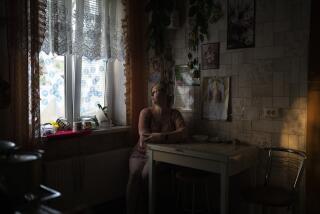Bosnian Serbs Fleeing Sarajevo Find Only Misery
- Share via
VISEGRAD, Bosnia-Herzegovina — Tens of thousands of Bosnian Serbs fleeing the outskirts of Sarajevo are turning up in out-of-the-way towns like this one, only to discover that the anguished decision to leave the Bosnian capital marked only the beginning of their misery.
More than 1,000 residents from Vogosca, Ilidza and other Serb-populated suburbs of Sarajevo are camped out here in school classrooms, burned-out houses and cramped barracks built years ago for construction workers.
Many have no running water or electricity. Some have to walk more than a mile to get a handout of bread or soup. In one settlement, 200 people share a single outhouse.
“We finally got electricity, but if we all turn on our cookers at the same time, we lose it,” said Vida Kubara, 45, who moved with about 50 co-workers at a Sarajevo-area auto-parts factory to a group of prefabricated buildings here. “If you want to have heat, no one can turn on his cooker.”
Three-and-a-half years of war made Bosnians of all ethnicities accustomed to toughing it out. But many of those arriving here from the Sarajevo area are finding conditions away from the Bosnian capital far worse than those back home, particularly since the end of the war made life more comfortable in the big city.
Transplanted residents say they do not regret leaving Sarajevo because they feared the incoming Muslim-Croat federation police taking control of Bosnian Serb suburbs under the Dayton, Ohio, peace accord. But they already long for what they left behind.
“To spend four years of war fighting for something, and then end up with this as my house, it is very hard,” said Berjan Slavisa, 22, a Bosnian Serb soldier and former Sarajevo tour guide who has staked out a burned-out restaurant as a home for himself--and 13 relatives. “We left an apartment and a nice house back in Ilidza.”
Slavisa and his family made six trips on the icy, winding roads from Ilidza before they managed to haul everything to Visegrad. They financed each journey by selling something from the last one--first the deep freezer, then the television and finally the video player. They hope to buy windows for the house by selling other valuables, but for now plastic sheets fend off the wind and snow.
“The mentality is different here,” said Slavisa, who sleeps with an automatic rifle to protect his family’s belongings. “Sarajevo, after all, was the capital. Visegrad is nothing more than a village.”
Like many of the other towns designated as resettlement centers by Bosnian Serb authorities, Visegrad once had a majority-Muslim population that was killed or expelled during the war, leaving blocks and blocks of empty housing. More than 13,000 Muslims lived in the town.
Unfortunately for refugees like Slavisa, most of the houses were torched by the triumphant Bosnian Serbs, who never imagined a day when their own people would come desperately seeking a roof over their heads. An estimated 40,000 Bosnian Serbs are expected to leave the suburbs of Sarajevo before those areas revert in their entirety to Bosnian-government control March 19.
Visegrad has been selected by Bosnian Serb authorities as a destination point for refugees from Vogosca, but the government plan--which foresees dispersing the Sarajevo Serbs throughout Bosnian Serb territory--has been ignored by many refugees, who have simply chosen towns where relatives and friends live or where they have been able to hitch a ride.
“A lot of people arrive in tears, saying they don’t care where they go, just so they don’t have to stay in Sarajevo,” said Rajka Furtula, a teacher at the Visegrad elementary school, where classes have been suspended to allow refugees to live in classrooms.
More to Read
Sign up for Essential California
The most important California stories and recommendations in your inbox every morning.
You may occasionally receive promotional content from the Los Angeles Times.













